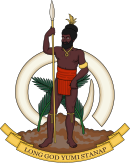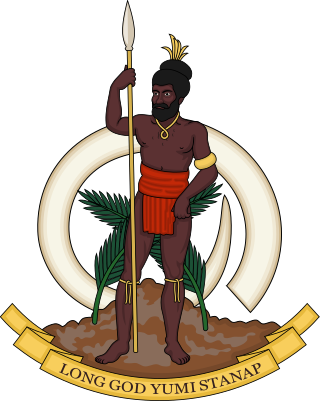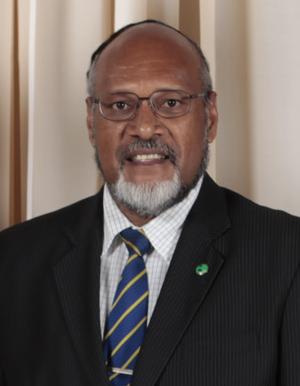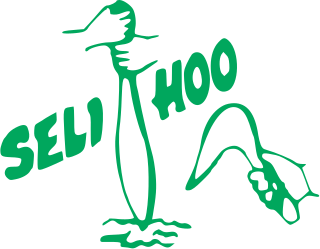Friend Melanesian Party | |
|---|---|
| Founded | 1975 |
| Ideology | Decentralisation |
| Political position | Centre |
| Parliament | 0 / 52 |
 |
|---|
The Friend Melanesian Party (FMP) is a political party in Vanuatu. The party is usually seen as close to the Union of Moderate Parties.
Friend Melanesian Party | |
|---|---|
| Founded | 1975 |
| Ideology | Decentralisation |
| Political position | Centre |
| Parliament | 0 / 52 |
 |
|---|
The Friend Melanesian Party (FMP) is a political party in Vanuatu. The party is usually seen as close to the Union of Moderate Parties.
The FMP was formed in 1975 by French-speaking Protestant Pisovuke Albert Ravutia as a reaction to the success of the New Hebrides National Party. [1] [2] [3] In 1981 it joined the francophone Union of Moderate Parties alliance, but due to the Catholic dominance of the alliance in contrast to the Protestant majority in the FMP, it opted to remain an individual party and fielded candidates against the UMP. [2]
In the 1983 general elections the party received 2.3% of the vote, winning a single seat in Parliament, aligning itself with the UMP. [3] It retained its seat in the 1987, 1991 and 1995 elections, but did not contest the 1998 elections. The party returned to Parliament after winning one seat in the 2002 elections, but lost it in the 2004 elections. It also remained seatless after the 2008 elections.
In the 2012 elections the party nominated three candidates. [4] It received 0.9% of the vote, failing to win a seat. In the 2016 elections the party fielded two candidates, [5] winning one seat; Edwin Amblus in Santo. [6] However the party lost its parliamentary representation following the 2020 election and failed to get it back in the 2022 one.
| Election | Leader | Votes | % | Seats | +/– | Status |
|---|---|---|---|---|---|---|
| 1975 | Pisovuke Albert Ravutia | 457 | 0.89 (#6) | 0 / 29 | New | Extra-parliamentary |
| 1977 | Boycotted | 0 / 38 | Extra-parliamentary | |||
| 1979 | Did not contest | 0 / 39 | Extra-parliamentary | |||
| 1983 | 1,014 | 2.30 (#6) | 1 / 39 | Opposition | ||
| 1987 | 1,119 | 1.99 (#4) | 1 / 46 | Opposition | ||
| 1991 | 1,157 | 1.86 (#7) | 1 / 46 | Opposition | ||
| 1995 | 2,019 | 2.66 (#4) | 1 / 50 | Opposition | ||
| 1998 | Did not contest | 0 / 52 | Extra-parliamentary | |||
| 2002 | 1,566 | 1.98 (#9) | 1 / 52 | Opposition | ||
| 2004 | 1,101 | 1.19 (#13) | 0 / 52 | Extra-parliamentary | ||
| 2008 | 270 | 0.26 (#24) | 0 / 52 | Extra-parliamentary | ||
| 2012 | 1,069 | 0.89 (#19) | 0 / 52 | Extra-parliamentary | ||
| 2016 | 1,465 | 1.30 (#17) | 1 / 52 | Opposition | ||
| 2020 | 996 | 0.69 (#24) | 0 / 52 | Extra-parliamentary | ||
| 2022 | 229 | 0.17 (#36) | 0 / 52 | Extra-parliamentary | ||

The politics of Vanuatu take place within the framework of a constitutional democracy. The constitution provides for a representative parliamentary system. The head of the Republic is an elected president. The prime minister of Vanuatu is the head of government.

The Union for a Popular Movement was a liberal-conservative political party in France, largely inspired by the Gaullist tradition. During its existence, the UMP was one of the two major parties in French politics along with the Socialist Party (PS). In May 2015, the party was succeeded by The Republicans.

Edward Nipake Natapei Tuta Fanua`araki was a Vanuatuan politician. He was the prime minister of Vanuatu on two occasions, and was previously the minister of Foreign Affairs briefly in 1991, the acting president of Vanuatu from 2 March 1999 to 24 March 1999 and the deputy prime minister. He was the president of the Vanua'aku Pati, a socialist, Anglophone political party.

Rialuth Serge Vohor is a Vanuatuan politician. He hails from the largest island of Vanuatu, Espiritu Santo, from Port Olry.

The Romanian National Unity Party was a nationalist political party in Romania between 1990 and 2006.

The Vanua'aku Pati is a democratic socialist political party in Vanuatu.

The Union of Moderate Parties is a liberal political party in Vanuatu founded in 1981. At the last general election, held on 22 January 2016, they won 9.73% of the vote and 6 seats. It is currently headed by Ishmael Kalsakau.

Legislative elections were held in France on 10 June and 17 June 2007 to elect the 13th National Assembly of the Fifth Republic, a few weeks after the presidential election run-off on 6 May. 7,639 candidates stood for 577 seats, including France's overseas possessions. Early first-round results projected a large majority for President Nicolas Sarkozy's Union for a Popular Movement (UMP) and its allies; however, second-round results showed a closer race and a stronger left. Nevertheless, the right retained its majority from 2002 despite losing some 40 seats to the Socialists.

General elections were held in Vanuatu on 2 September 2008. In July the Melanesian Progressive Party requested that they be postponed, contesting the constitutionality of the Peoples Representation Act No. 33 of 2007, which allegedly enabled voters in certain constituencies to vote in two constituencies. The Principal Electoral Officer, Martin Tete, confirmed that the election would take place on 2 September, as scheduled. The day was declared a national holiday, to encourage people to vote.

The Vanuatu Labour Party is a political party in Vanuatu. The party was established on 3 June 1987. It was founded on the initiative of various trade union organizations in order to contest the 1987 parliamentary election. The proposal to found the party was first presented by Ephraim Kalsakau, a leader of the Vanuatu Municipal Workers Union.

General elections were held in Vanuatu on 30 November 1987. Ni-Vanuatu voters were invited to elect the 46 members of an expanded national Parliament, which had previously held 39 seats.

General elections were held in Vanuatu on 30 November 1995. Ni-Vanuatu voters were invited to elect the 50 members of the national Parliament.

The Cabinet of Vanuatu is the cabinet of the government of the Republic of Vanuatu.
A by-election was held in the Tanna constituency in Vanuatu on 27 May 2013. It followed the death of incumbent MP Harry Iauko, who was also the Minister for Infrastructure, Public Utilities and Public Service.
A by-election to the Parliament of Vanuatu was held in the constituency of Port-Vila on 15 October 2015. It followed the death of sitting MP Edward Natapei, of the centre-left Vanua'aku Pati. Natapei died after a long illness in July. Although Port-Vila is a multi-member constituency, only one seat was vacant, and therefore only one new member was elected.

General elections were held in Vanuatu on 22 January 2016. The previous elections occurred in October 2012. The president of Vanuatu, Baldwin Lonsdale, dissolved the Parliament of Vanuatu in November 2015. This occurred after the conviction of 14 parliamentarians for bribery. The convicted MPs include former Prime Ministers Serge Vohor and Moana Carcasses Kalosil. The president called for a snap election to form a new government.

The Natatok Indigenous People's Democratic Party (NIPDP), sometimes simplified to the Natatok Party, is a political party in Vanuatu.

The Iauko Group or Eagle Group is a political party in Vanuatu.
Maria Crowby was a politician from Vanuatu. She was a Member of the Parliament of Vanuatu for the Union of Moderate Parties. She was elected in 1987 for the electorate of Port Vila, in the same election as Motarilavoa Hilda Lin̄i; the two women were the first women members of parliament elected in Vanuatu. Crowby lost the seat in 1988.
Legislative by-elections were held in Vanuatu on 12 December 1988 and 28 November 1989 to fill twenty-three vacant seats, including twenty-two made vacant by a political crisis.